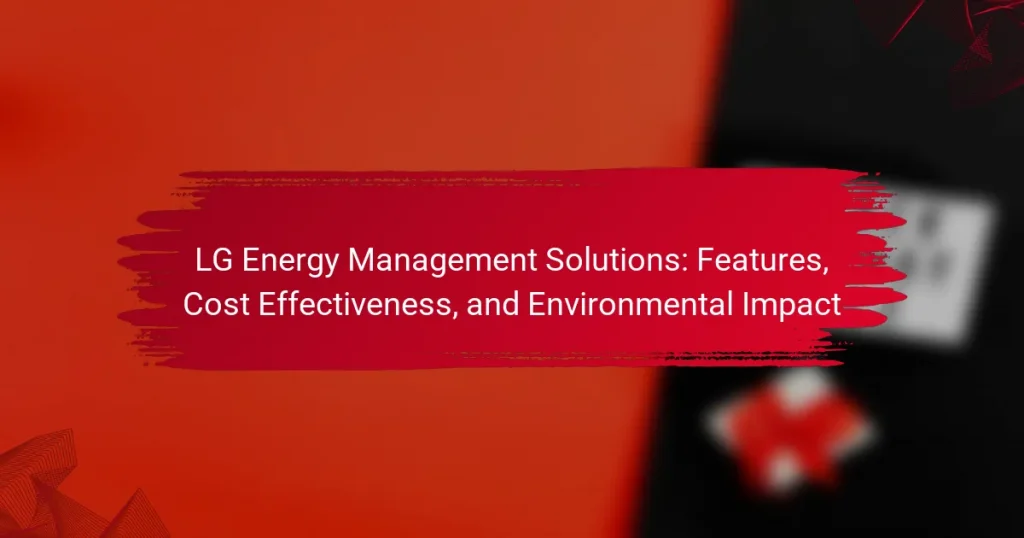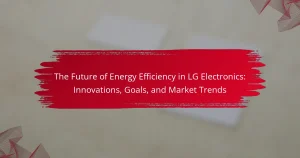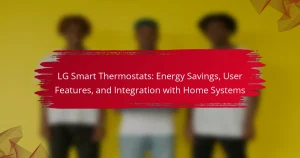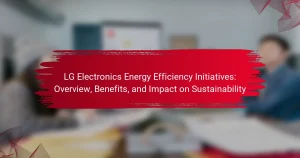LG Energy Management Solutions consist of integrated systems designed to optimize energy usage and enhance operational efficiency for businesses. These solutions encompass both software and hardware that monitor and control energy consumption, aiming to reduce costs while promoting sustainability. Key features include the integration of renewable energy sources, energy storage systems, and real-time data analytics for improved decision-making. By leveraging these technologies, organizations can achieve regulatory compliance, meet environmental goals, and significantly lower their carbon footprint. The article will explore the features, cost-effectiveness, and environmental impact of LG Energy Management Solutions across various sectors.
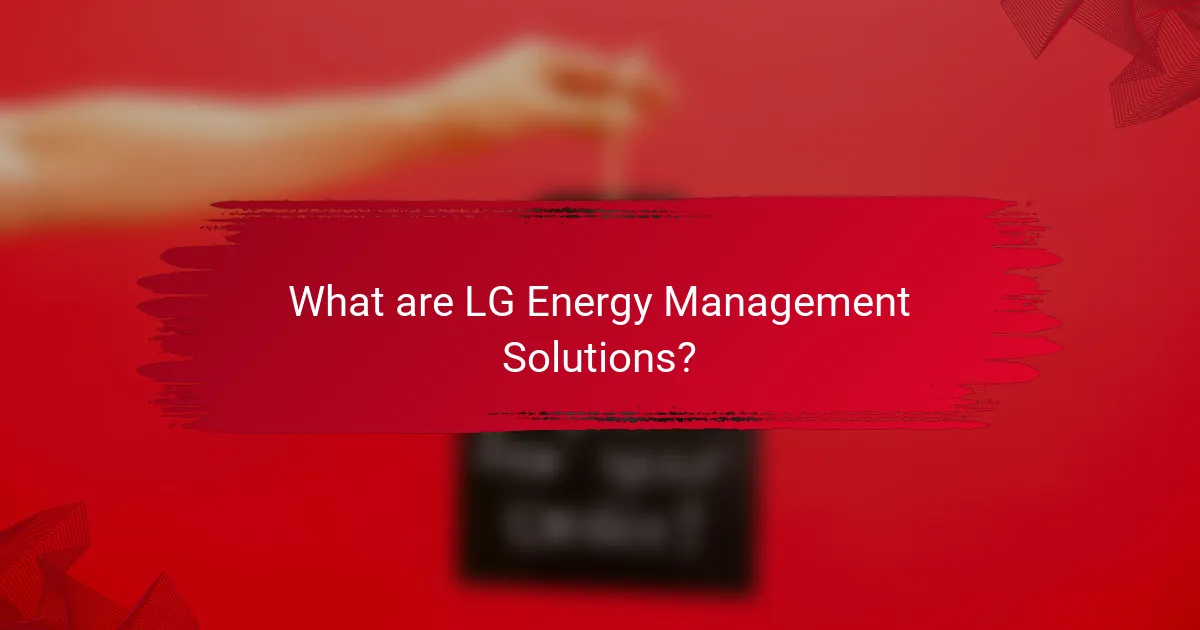
What are LG Energy Management Solutions?
LG Energy Management Solutions are systems designed to optimize energy usage and enhance efficiency. These solutions include software and hardware that monitor and control energy consumption. They aim to reduce operational costs for businesses and improve sustainability. LG’s offerings often integrate renewable energy sources and energy storage systems. They provide real-time data analytics for informed decision-making. This technology helps organizations meet regulatory requirements and environmental goals. By implementing these solutions, companies can significantly lower their carbon footprint. LG Energy Management Solutions represent a strategic approach to energy efficiency in various sectors.
How do LG Energy Management Solutions function?
LG Energy Management Solutions function by integrating advanced technology to optimize energy usage. These solutions utilize real-time data analytics to monitor energy consumption patterns. They provide insights that help users make informed decisions about energy efficiency. The system can automatically adjust energy loads based on demand and supply conditions. This functionality enhances operational efficiency and reduces energy costs. LG’s solutions also support renewable energy integration, promoting sustainable practices. The effectiveness of these systems is backed by case studies demonstrating significant energy savings and improved performance metrics.
What technologies are integrated into LG Energy Management Solutions?
LG Energy Management Solutions integrate advanced technologies such as IoT, AI, and analytics. IoT enables real-time monitoring of energy consumption. AI optimizes energy usage through predictive analytics. Analytics tools provide insights for better decision-making. These technologies enhance energy efficiency and sustainability. They support smart grid integration for improved energy distribution. LG’s solutions also include renewable energy management features. This integration leads to reduced operational costs and environmental impact.
How do these technologies enhance energy efficiency?
LG Energy Management Solutions enhance energy efficiency by optimizing energy consumption and reducing waste. These technologies utilize smart algorithms to analyze energy usage patterns. By monitoring real-time data, they can identify inefficiencies and suggest improvements. For instance, automated controls can adjust lighting and HVAC systems based on occupancy. This leads to significant reductions in energy costs. Studies show that implementing such solutions can decrease energy usage by up to 30%. Additionally, integration with renewable energy sources further enhances efficiency. Overall, these technologies promote sustainable energy practices and lower environmental impact.
What are the key features of LG Energy Management Solutions?
LG Energy Management Solutions offer several key features. These include real-time energy monitoring and analytics. Users can track energy consumption patterns effectively. The solutions provide automated energy management capabilities. This helps in optimizing energy usage and reducing costs. Integration with renewable energy sources is also a significant feature. It supports solar and wind energy systems. Additionally, LG offers demand response solutions. These allow users to adjust energy usage during peak times. Overall, these features enhance energy efficiency and sustainability.
What specific functionalities do these solutions provide?
LG Energy Management Solutions provide functionalities such as real-time energy monitoring, predictive analytics, and automated energy optimization. These solutions enable users to track energy consumption patterns effectively. Real-time monitoring allows for immediate adjustments to energy usage. Predictive analytics forecasts future energy needs based on historical data. Automated optimization adjusts settings to enhance energy efficiency. Additionally, these solutions support integration with renewable energy sources. They facilitate demand response strategies to reduce energy costs during peak times. These functionalities contribute to overall energy savings and sustainability efforts.
How do LG Energy Management Solutions support real-time monitoring?
LG Energy Management Solutions support real-time monitoring through advanced software and hardware integration. These solutions utilize IoT technology to collect data from energy systems continuously. Real-time data analytics provide insights into energy consumption patterns. Users can access performance metrics via a user-friendly dashboard. Alerts and notifications enable prompt responses to energy anomalies. The system’s scalability allows it to adapt to various energy infrastructures. This capability enhances operational efficiency and reduces energy waste. LG’s solutions are designed to optimize energy management across multiple sectors.
What is the cost-effectiveness of LG Energy Management Solutions?
LG Energy Management Solutions are cost-effective due to their ability to optimize energy usage and reduce operational costs. These solutions can lead to savings of up to 20% on energy bills. They utilize advanced analytics to monitor and manage energy consumption efficiently. This results in lower energy waste and improved resource allocation. Additionally, LG’s systems often qualify for various energy efficiency incentives and rebates. These financial benefits enhance the overall return on investment. Businesses adopting these solutions can expect significant long-term savings while improving sustainability.
How do these solutions compare in terms of initial investment?
The initial investment for LG Energy Management Solutions varies based on the specific solution chosen. For example, residential battery systems typically require an investment of around $10,000 to $15,000. In contrast, commercial energy management systems may range from $50,000 to several million dollars, depending on the scale and complexity. This cost reflects the advanced technology and integration capabilities provided by LG solutions. Additionally, the potential for long-term savings on energy bills can offset the initial investment over time. Overall, the initial costs are significant but are often balanced by future energy savings and environmental benefits.
What long-term savings can users expect from implementing these solutions?
Users can expect significant long-term savings from implementing LG Energy Management Solutions. These solutions optimize energy consumption, leading to reduced utility bills. A study by the U.S. Department of Energy found that energy management systems can achieve savings of 10-30% on energy costs. Additionally, users benefit from improved operational efficiency, which can further decrease expenses. Over time, the return on investment can exceed initial implementation costs, often within 1-3 years. This makes energy management solutions a financially sound choice for users aiming to reduce long-term operational costs.
How do LG Energy Management Solutions impact the environment?
LG Energy Management Solutions positively impact the environment by optimizing energy efficiency and reducing carbon emissions. These solutions enable businesses to monitor and manage energy consumption in real-time. By implementing advanced analytics, LG helps identify areas for energy savings. This leads to decreased reliance on fossil fuels and lower greenhouse gas emissions. For instance, LG’s systems can reduce energy waste by up to 30%. Additionally, these solutions support the integration of renewable energy sources. This further minimizes environmental impact and promotes sustainability. Overall, LG Energy Management Solutions contribute to a cleaner and more sustainable future.
What are the environmental benefits associated with these solutions?
LG Energy Management Solutions contribute to various environmental benefits. They enhance energy efficiency in buildings. This reduction in energy consumption lowers greenhouse gas emissions. According to the U.S. Environmental Protection Agency, energy-efficient solutions can reduce emissions by up to 30%. These solutions also promote the use of renewable energy sources. By integrating solar and wind energy, they further decrease reliance on fossil fuels. Additionally, LG solutions support smart grid technology. This technology optimizes energy distribution and reduces waste. Overall, these benefits lead to a more sustainable environment.
How do these solutions contribute to sustainability efforts?
LG Energy Management Solutions enhance sustainability by optimizing energy consumption and reducing waste. These solutions employ advanced technologies to monitor and manage energy use in real-time. By doing so, they help businesses lower their carbon footprint. For instance, energy-efficient systems can reduce greenhouse gas emissions significantly. Additionally, these solutions support the integration of renewable energy sources. This further promotes a cleaner energy grid. Studies show that effective energy management can lead to a 20-30% reduction in energy costs. This cost savings incentivizes companies to adopt sustainable practices. Overall, LG Energy Management Solutions play a crucial role in fostering a more sustainable future.
What industries can benefit from LG Energy Management Solutions?
Manufacturing, healthcare, retail, and education industries can benefit from LG Energy Management Solutions. These solutions help optimize energy consumption and reduce costs. In manufacturing, energy management can streamline operations and enhance productivity. Healthcare facilities can improve energy efficiency while ensuring patient comfort. Retail businesses benefit from lower energy bills and improved sustainability. Educational institutions can manage energy use effectively, leading to cost savings.
Which sectors have seen significant improvements through these solutions?
The sectors that have seen significant improvements through LG Energy Management Solutions include manufacturing, commercial real estate, and renewable energy. In manufacturing, these solutions enhance operational efficiency and reduce energy costs. Commercial real estate benefits from optimized energy consumption, leading to lower utility expenses and improved sustainability ratings. The renewable energy sector experiences better integration of energy sources and increased reliability. These improvements are backed by case studies showing up to 30% energy savings in manufacturing and a 25% reduction in energy costs for commercial buildings.
How can businesses tailor LG Energy Management Solutions to their needs?
Businesses can tailor LG Energy Management Solutions to their needs by customizing system configurations. This includes selecting specific software features that align with operational goals. Businesses can integrate existing infrastructure with LG’s solutions for seamless performance. They can also adjust energy monitoring parameters to fit specific usage patterns. Additionally, companies can implement reporting tools that provide insights relevant to their energy consumption. Training for staff on the tailored system can enhance efficiency. LG’s solutions also allow for scalability, enabling businesses to expand capabilities as needed. This adaptability ensures that the energy management system evolves with changing business requirements.
What are the best practices for implementing LG Energy Management Solutions?
The best practices for implementing LG Energy Management Solutions include thorough planning, stakeholder engagement, and continuous monitoring. Begin with a detailed assessment of energy consumption patterns. This helps in identifying areas for improvement. Engage stakeholders early in the process to ensure buy-in and support. Provide training for staff to maximize the use of the solutions. Establish clear goals and metrics to measure success. Regularly review performance data to adjust strategies as needed. Utilize LG’s support resources for troubleshooting and optimization. These practices enhance efficiency and ensure effective implementation of energy management solutions.
How can organizations ensure successful integration of these solutions?
Organizations can ensure successful integration of LG Energy Management Solutions by following a structured approach. First, they should conduct a thorough assessment of their current energy systems. This helps identify compatibility and integration points with the new solutions. Second, organizations need to engage stakeholders early in the process. Involving staff, management, and technical experts ensures alignment and addresses potential concerns. Third, providing comprehensive training for users is crucial. Training enhances user confidence and maximizes the effectiveness of the solutions.
Additionally, organizations should establish clear performance metrics. This allows for monitoring and evaluation of the integration process. Regular feedback loops can help in making necessary adjustments. Furthermore, leveraging technical support from LG can assist in troubleshooting and optimizing the solutions. Research indicates that organizations that adopt a systematic approach to integration see improved operational efficiency and cost savings. For example, a study by the International Energy Agency found that structured energy management practices can reduce energy costs by up to 20%.
What common challenges should be anticipated during implementation?
Common challenges during implementation include resistance to change from employees. Organizations often face difficulties in adapting to new systems. Technical issues may arise, such as software integration problems. Training employees can also be a significant hurdle. Insufficient resources may limit the implementation process. Additionally, aligning the new solutions with existing processes poses challenges. Lastly, measuring the effectiveness of the new system can be complex. Each of these challenges can hinder the successful adoption of energy management solutions.
LG Energy Management Solutions are advanced systems designed to optimize energy usage through real-time monitoring and analytics, ultimately enhancing efficiency and sustainability for businesses. This article explores the key features of these solutions, including their integration of IoT and AI technologies, cost-effectiveness, and significant environmental benefits, such as reduced carbon emissions. Additionally, it addresses the impact of these solutions across various industries, the best practices for implementation, and the common challenges organizations may face during the integration process. Overall, LG Energy Management Solutions represent a strategic approach to energy efficiency and sustainability in diverse sectors.
